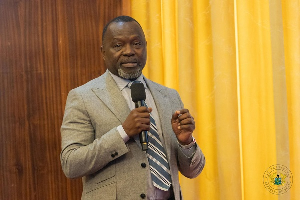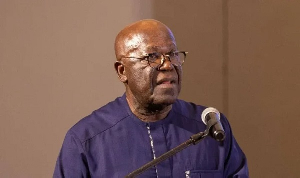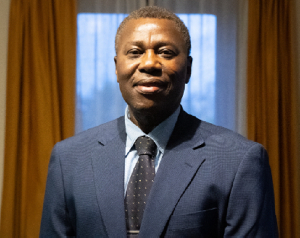Many a time, one is confronted with the challenge of putting down thoughts and ideas that may engender debate or contribute meaningfully towards the search for a solution to an existing problem. I have tried my best to avoid the tendency of procrastinating when the urge to write comes up, especially when later events tend to distort original ideas as for example, many an academic would want to gather material gradually before stringing thoughts together to create one informative piece. When numerous excited fellows agitate to become integral parts of a campaign due mainly to exuberance, it is incumbent on those who know and understand the intricacies of campaigns to indicate what really pertains within the environment they seek to become a part of.
Since 1996 when the powers that be, acting in concert with certain vested political conspirators within the state schemed to negate the presidential ambitions of Andrews Kwame Pianim, arguably the best president Ghana never had, most of us who were involved with his bid and have continued to participate in campaign matters related to the New Patriotic Party have gained enormous experience but have unfortunately failed to record these things for the benefit of those who now aspire to tread the route of politics. In all sincerity, this article was conceived of as an academic piece until I came to the conclusion that save for those who need reference material from journals or other authoritative sources in the field of academia, one might only end up not sharing the enormous experience gathered for the benefit of all and more importantly, lose the opportunity of alerting the upcoming political activist of the dynamics, intricacies, intrigues and personal aggrandizement issues that underpin every single campaign some of us have been privileged to be associated with since 1992.
Contrary to the perception that the abundance of several contenders necessarily creates enemies and hostile attitudes, the shocking reality is that many of the people who play various roles within the several camps do talk to each other. Indeed, it may be of interest to find out what it is that makes a Boye Laryea from “Camp Aliu” and a Von Brazi from a “Camp Nana” share drinks with Eric Kwatia from “Camp Hackman” and enjoy lunch paid for by “friends of Addo Kufuor” in the meeting place of “Camp CaCaCO” after a round of intense debate spurred by Prince Aboagye of “Osafo Nie” fame due to perception trends espoused from the ‘“Dan Deal”’ camp, whether Vincent from Dr. Apraku’s corner disagrees with Roland Darko on Amoako-Tuffuor’s thought-provoking ideas or not. What is clear is that the love of the party by these apparatchiks transcends the loyalty to the individuals whose campaigns the aforementioned find themselves driving. Thus, irrespective of the personal differences and preferences of party people, there is always that bond, honed over years of continuous struggle, which no single individual can break because of his/her ambition. It is this level of camaraderie, fine-tuned especially over the last decade that makes most of us boldly confident that the aftermath of December 22 would leave the NPP stronger than it has ever been, notwithstanding and contrary to the fears of the doomsday wolf-criers whose main line of thinking is that the proliferation of camps and support groups would leave unbridgeable fissures in the fine architecture of the ruling New Patriotic Party. If for nothing at all, it is refreshing in the highest order to note that those party activists on whom the future and destiny of the party rests are resolved to checkmate any individual, bloc or force that would display the slightest hint of wanting to veer off course: clearly such an initiative would be an individual affair. Nobody would follow such a breaker of ranks to ignominy.
The question then remains as to why I would make such emphatic statements when as they say, “a week is a long time in politics” and many events occur to make for “strange bedfellows” as far as politics is concerned. The truth is that in every campaign worth its name, there is a collection of numerous individuals with various inclinations, idiosyncrasies, varied expectations and usually undisclosed motivations. More often than not, there is very little love lost between the principals of any campaign team and they have often in private, been extremely critical of the very people they serve as well as the other companions with whom they necessarily have to serve the collective interests of their campaign. This takes the form of “turf wars”, largely the result of the egos of the players involved, the respect and deference they show towards each other and especially the constraints placed on them by the blocs they represent within whichever camp they belong to. Usually, it is the fight between the “we’ve been here for long” group against the “Johnny Just Comes” that gives the greatest sense of worry to a camp and should the leader, manager or strategists not move to transcend the “norming stage” of campaign team formation as quickly as possible, lots of man hours would be lost resolving petty issues that need not weaken the campaign architecture in the first instance, but, for reasons of ego massaging and pacification, become a key characteristic of the team’s day to day activities.
It is the case that in order to give an outside impression that all is well and good with the team, general campaign and quest for victory, many a campaign manager or candidate would tend to overlook personal quibbles between either his/her core team (the face of the campaign) or rival groups lower down the campaign structure (campaign footsoldiers and activists/supporters). One dangerous aspect of each campaign is the tendency of gossip to be taken as fact by the candidate-aspirant who due to the enormous pressure on him/her is usually averse to many of the happenings within the lower strata of his/her own campaign outfit. Indeed there are those who thrive on rumour-mongering and gossip, just to gain the ear of the candidate. Should their opponents be the type that talk less and act more, theirs would be a sorry story as the candidate is almost always caught as a hostage of the gossip and rumour mongers because - well- which candidate does not like to hear stories about the enemy within? It is only when light is shed on the purveyors of those weird stories much later when it is too late that the candidate tries to play God by rewinding the hands of time, unfortunately and usually when it is impossible to even revel in the luxury of dreaming.
Mention must be made of the fact that every campaign also reveals and illustrates the frailties of human nature, the avaricious ambitions of especially businessmen who find it expedient to double as politicians together with their rivalries, jealousies and insatiable thirst for recognition and adoration within groups they know next to nothing about. The NPP is refreshingly forthright in upholding the conventional credo of serving one’s term and rising through the ranks. It is only by accident that businessmen for example who have not served their term can earn or gain the respect of activists who understand this operating principle of the party: under no circumstance would there be a ceding of grounds to such persons who seem to be mastering the art of expediency enough to graft themselves unto the campaign frontline of any team and if what friends from the other camps say holds true, then the history of the NPP would march on, regardless of the momentary weakness of the figures that strut the party’s highest stages. Needless to say, notwithstanding the doling out of cash by such persons to gain a semblance of respectability, their mere presence rather tends to solidify the bonds that old friends have established over the years and culminates in a conspiracy that almost always leads to loss for the ambitious businessman who sees the party as a stepping-stone to fame and fortune. Of course the harsh reality is that because party activists know the price they paid for putting the party wherever it is within the body-politic, they also ‘expediently’ collaborate to checkmate such “infidels” with devastating results. It is quite plausible that this tendency cuts across all political parties.
A more disturbing phenomenon is the tendency of a campaign to be challenged not only by gossip and innuendo but more seriously, by verifiable evidence that certain people within the team are skimming off funds meant to facilitate one thing or the other and actually diverting funds towards their own private affairs. Take for example Mr. X makes a donation to the campaign effort through Mr. Y. Mr. Y refuses to inform both the candidate and the secretariat of the donation. Research or Intelligence officers within the campaign pick up complaints from Mr. X through mutual friends that “the candidate did not even dignify me with a phone call to say thank you”. Now should this matter be brought to the attention of the candidate to ensure that the right thing is done, or should the information be withheld from the candidate largely because Mr. Y has been relatively successful at inciting the candidate against other persons in his team so that such a reportage would be deemed as “further evidence of the animosity” between them? When a campaign officer goes to the field and shortchanges persons to who his/her sole duty is to present some form of donation, do you “cover” the “iniquity” of the person just because he is on “our side” of the internal struggle within the same camp?
One noticeable issue within each camp is the presence and/or absence of research and intelligence gizmos. If the campaign lacks one, gossip would be the operating premise on which the candidate would base his/her actions with very unwelcome results in the short and long term. More fatally, it becomes the basis for destroying trusts, reputations and espirit de corp within the party after the candidate has been elected. If on the other hand the campaign has a research and intelligence unit, the operatives therein become the target of slight and outright slander from two quarters: those within who fear exposure of their wrongs by the unit and more dangerously, those who have tried to recruit moles, have achieved relative success but who know that their activities are known to the research unit. In such cases, the most ardent opponent of the research unit is the sole beneficiary of this back-stabbing tendency, mostly a non-party person who for reasons enumerated above and much more, finds himself close to the candidate and at the frontline of the campaign effort. To make sure that his/her ‘tracks’ are covered, this traitor tends to stick with the candidate “eternally”, sometimes closer than the ‘first-lady-to-be’ to the extent that those who travel from afar to meet the candidate for one reason or the other are always told “he is in a meeting” when in reality, the candidate is virtually being held hostage by “Mr. Lies”! I have come to realize personally and professionally that “Mr. Lies” does this in order to block any unraveling of his misdeeds by the candidate should someone come reporting. Unfortunately for such persons, the candidate almost always finds out in the end, rather later though, that “Mr. Lies” has always had him for lunch, serving him concocted custard when all the candidate required was a dose of truth and honesty. At that confluence, research would only shut up and watch the candidate show dexterity in handling such issues as a test of his true leadership quality: there is no gain from rubbing it in when clearly, lies, more lies and ruthless undermining of a division within the campaign effort has been the norm rather than the exception. But should the campaign aficionado within the research and intelligence unit keep quiet when especially the candidate has been blinded by the sweet words of a “Mr. Lies”?
Sometimes, there are situations and scenarios when campaign personnel and officials are assigned roles in intricate situations and maneuvers without being alerted to the true nature of their mission. This is a legitimate privilege of political masters which creates a lot of uneasiness of campaign operatives for one basic reason: there is a thin line dividing the use and misuse of this privilege which is extremely difficult to define and more disturbingly, interpret, thereby leading to dampening of morale and conscious withdrawal from full capacity in some cases. When key figures realize that they have been used for other purposes other than that for which they have been made to believe, they lose trust in their superiors and naturally take measures and precautions to protect their integrity, or in some cases, they simply walk away and thus inflict damage on the campaign by denying it the benefit of their expertise. When they choose not to walk away, they tend to become apathetic or highly secretive, thereby creating problems of trust and engendering uncertainty about their loyalty to the entire campaign effort. In some rare cases, such people simply start to act “erratically” by seizing the initiative to embark upon usually unauthorized operations or in the light of previous experience, bypass the formal system and damn the consequences of their solo initiatives. How does the campaign team cope with such self-inflicted tendencies by loose canons?
Perhaps, the most frightening of all these is the presence of relatives within the camp of an aspirant. Ghanaian culture and tradition has unfortunately bequeathed a trend that makes for close relatives to virtually double as special assistants even to persons appointed by the executive into positions of trust. That is why one can go to certain ministries and find that the most powerful person after the minister is not his/her deputy but some cousin, in-law, or childhood friend of the minister. Sometimes, such persons actually determine who gets to see the minister! Now I leave the reader to transpose this attitude from the ministerial level and graft that unto a campaign and it would not be difficult to see the campaign nightmare this tendency creates. The unequivocal effect of this is to breed contempt and disdain for the candidate who unfortunately is hardly ever told of the damage being done by these “bulwarks around the candidate” or even if he/she knows, is largely incapable of doing anything to offset this worrying trend, mainly because such problematic relatives “know too much” and it would be dangerous to cut them loose. If the candidate is unfortunate enough to have such relatives who love to dabble in the esoteric, your guess is as good as mine. This is why it has become the norm to hear across board that “as for him, we like him…there is no problem with him. It is the people around him that are the problem….if he doesn’t deal with them, that would be his downfall”. How does a campaign activist navigate such delicate internal but political minefields and come out unscathed?
Equally important but somewhat more significant to the above is what I would classify as the “professional don’t rock the boat” personalities within a camp. Across all the camps and throughout my observation period, it has become manifestly clear that there are some who delight in playing the “Mr./Mrs. Good Fellow”. Their actions are akin to the old Mediterranean way of delicately treading upon grapes in order to extract the juice for wine production purposes. These are the ones that even when it is abundantly clear that they must seize the initiative to correct a wrong would rather choose to hide behind subordinates to execute that which their clout allows them to resolve in split seconds. Woe betides you if you work directly under such a person for in one breath, you necessarily have to stomach all the nonsense and machinations from rival groups within the camp while at the same time contending against your own boss whose image is more important to him/her perhaps second only to the success of the campaign. Thus, many a decisive action would be left untaken or even if done, at a time that is too late for anything meaningful and beneficial to be recorded for the campaign effort. More often than not, “Mr./Mrs. Good Fellow” create tensions within their own small group that either leads to defections or terrible clashes as the more ambitious and restless within the group simply override directives and damn the consequences. How does one operate under such persons without impairing the collective effort of the campaign team?
The campaign activist must juxtapose this against the very personality of the candidate/aspirant. I have come to appreciate how brittle the fortunes of political masters and potential historic figures are. One moment they are up on the high, a minute later their careers hang in the balance. In an encounter I would classify as “The Asamenkese Affair” and about which I can only write after January 7, 2009 (when the political configuration of Ghana would definitely change enough to allow me such freedom to mention personalities in positions of trust without impairing their status and current job descriptions), I found myself as the epicenter of a potential political earthquake and I felt an acute personal responsibility to bail a well-respected personality to “safe ground”. Within a space of 48 hours, I went through a crash programme that propelled me through the ranks of potential presidents, professional politicians, civil servants and personal aides the like of which I have never experienced in my one score and so many years life. There were times when I experienced an acute loneliness as people I believed I was working with melted into the woodwork when just a moment before they had all been present and vocal. I could literally touch the wheels turning in their heads and heart with the question “how will this affect me?” “How will I be perceived by the candidate/aspirant, my peers, my rivals and those who might lobby for me should we win?” I have seen friends and colleagues standing aloof, waiting for me to slip from my “too known”, preparing to distance themselves from my possible failure and yet, readying themselves to join in the triumph and festivities surrounding the very actions I have taken which they chickened out of, once success was assured. I have recounted this very personal experience to express a point: notwithstanding my schooling in the sensation of cynicism, egoism and human deviousness, absolutely essential tools in the practice of intelligence, one must have the extra ability to know when to pull the brakes on the effect of such attributes on the fortunes of a campaign effort. The failure to do this is to engender the continuation of a hostile world of evil passions and unbridled ambitions, the end result being that the foundations of the party would slowly be chipped at by a proliferation of “dog bite dog types” that only see the party as a stepping-stone and not the embodiment of their collective aspirations as far as their preferred development model of the Republic of Ghana is concerned. Does the personality of the candidate reflect a broad understanding of such issues enough for him to absorb the sweet and the sour without shaking his belief and trust in his own agents and agencies? Such is the challenge the campaign activist in the inner sanctums of an operation must daily cope with.
And then there is the candidate’s “almighty and omnipresent” wife! If she happens to be of the suspicious class, mainly because of some past foibles and peccadilloes of her husband, you would want to avoid her at all cost. Many are those who have reported unprintable invectives poured on them by potential “first-ladies-in-waiting” for daring to mention certain names in their presence. More frighteningly, if the candidate has a rather beautiful beau as a personal secretary or assistant…who almost always receives calls on his behalf (at this stage, I must restrict myself to men only, no pun intended), your guess is as good as mine: “tell my husband to call me immediately” (emphasis mine), uttered with a tone that would make the dry bones mentioned in the Book of Isaiah rattle with seismic panic! Now if such an assistant cannot take it anymore and talks to someone that also talks to someone, would the campaign operative be surprised to find on the front pages of leading newspapers: “Candidate’s Wife Furious At Husband…Personal Assistant Blamed For Marital Problems” with special embellishment of statements made in confidence to friends out of nothing but frustration? Yet, in all this, the campaign operative must act as a first line of defence when some mischievous newspaper reviewer calls for comments from whichever camp such a story has been written about. Do you lie your way out in a spin that would make Alistair Campbell clap for you or state the facts as you know them even if they would hurt the image and profile of the candidate in question? Such is the shark-infested waters of a campaign operation…damned if you do and damned if you don’t. Yet the challenge of the campaign is to rise above all these hurdles to attain the victory envisaged at the start. When a candidate is successful in his bid, those for whom jubilation is a must unfortunately jump unto the bandwagon with good cheer, not knowing and/or forgetting the trials and travails of the campaign operative whose sole purpose is to generate that victory for which jubilation serves as icing on the cake. At such moments, all the campaign operative does is to thank his God, shed a few tears of joy and immediately begins the process of planning for the next campaign- granted it beckons at him/her.















